On This Page
- Rendering Links ...
Years of Leadership 1928-1933
Candidate and Election
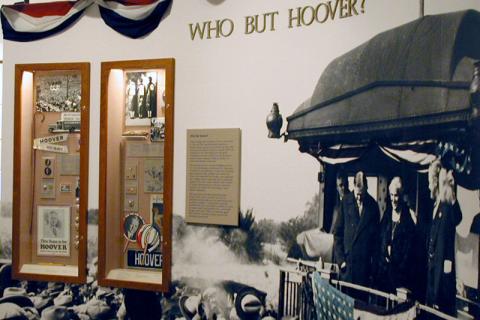
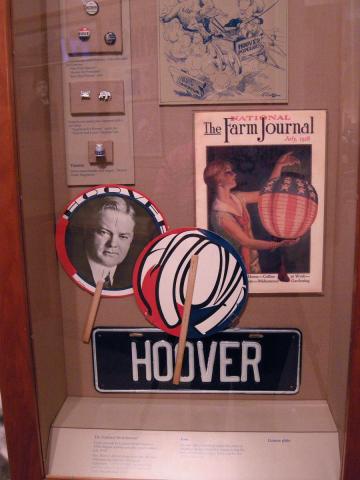
Herbert Hoover, at the age of 53, was on the verge of winning the Republican Party’s nomination for President when the convention began in June 1928. He had won primaries in several states with the support of women, progressives, internationalists, the new business elite, and corporate interests. The Old Guard Republicans, suspicious of Hoover’s activist approach to government, had little choice but to accept the popular Commerce Secretary as their candidate. Kansas Senator Charles Curtis was named to be his Vice Presidential running mate to shore up Hoover’s unpopularity among farmers.
In November, Hoover won 58 percent of the popular vote and 444 electoral votes to Al Smith’s 87. In December 1928, Hoover said, “My friends have made the American people think me a sort of superman. They expect the impossible of me and should there arise in the land conditions with which the political machinery is unable to cope I will be the one to suffer.”
Hoover's Accomplishments
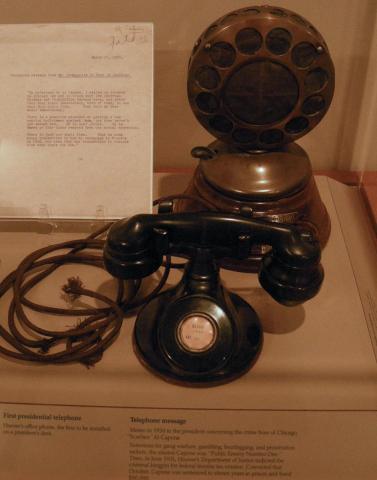
On March 4, 1929, Herbert Hoover became the 31st President of the United States. Brimming with constructive ideas to improve the federal government, the new President set to work with his characteristic energy. He announced an expansion of civil service protection throughout the federal government, ordered a review of private oil leases on public land in order to root out abuses that had caused scandals during the Harding Administration, and directed federal law enforcement officials to focus their energies on gangster-ridden Chicago.
Within days, President Hoover called a special session of Congress to address the farm crisis that had festered for over a decade—low commodity prices and overproduction were driving many farmers off their land. Hoover proposed a Federal Farm Board to finance agricultural cooperatives that would give farmers more bargaining power for better prices, and would help their members avoid overproduction. Within three months, Congress passed legislation that put Hoover's plan into action.
Hoover pressed ahead with plans for a dam on the Colorado River, and a massive program of prison reform. Hoover proposed and implemented the Veterans Administration to centralize all veterans' services into one agency. Hoover also reorganized the Bureau of Indian Affairs, and advocated federal loans for urban slum clearance. He proposed a federal Department of Education, as well as $50-a-month pensions for Americans over 65—both ideas fell by the wayside after Wall Street crashed.
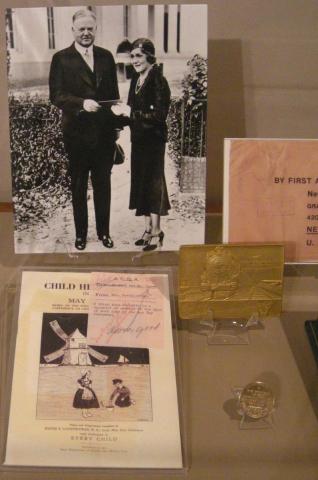
In November 1930, Hoover presided over the White House Conference on Child Health and Protection, which led to child welfare reforms at the state and local level. Another White House conference the following year focused on home building and home ownership.
On the international scene, Hoover worked to halt the arms race through the 1930 London Naval Conference and the 1932 World Disarmament Conference in Geneva. He initiated a "Good Neighbor Policy" to improve relations with Latin America, and began removing U.S. forces that had been sent to "keep the peace" in the region. He supported the establishment of a World Court and worked to make the U.S. a member. In January 1932, the United States refused to recognize Japan's 1931 invasion of Manchuria; through the Hoover-Stimson Doctrine, the administration hoped to mobilize world opinion to restore Chinese sovereignty.
Against all Odds
The whirlwind successes of Hoover's first months in office didn't last. A stock market crash in October 1929 signaled the beginning of the relentless economic collapse that became known as the Great Depression. Hoover's honeymoon with Congress ended even before the stock market crash. After creating the Federal Farm Board, Congress turned to revising the tariff—a major Republican campaign promise. Hoover lost control of the legislative process as members of Congress piled up protections for favored industries in their districts. In June 1930, Hoover reluctantly signed the resulting Smoot-Hawley tariff bill, even as economists warned that it could worsen the economic situation. After the 1930 mid-term election, Republican control of the House slipped away and Hoover faced an uphill battle for almost any legislation he proposed.
Severe droughts in the Midwest in 1930 and 1931 decimated the already weak agriculture sector, leaving even more farm families destitute, and virtually bankrupting Hoover's Farm Board. Bank failures in Europe in 1931 threatened to upend the rickety international financial system and further damaged America's sagging economy. Hoover staved off disaster by calling for a one-year moratorium on international debt payments, giving countries time to restructure their crushing debts—many of which were owed to U.S. banks.
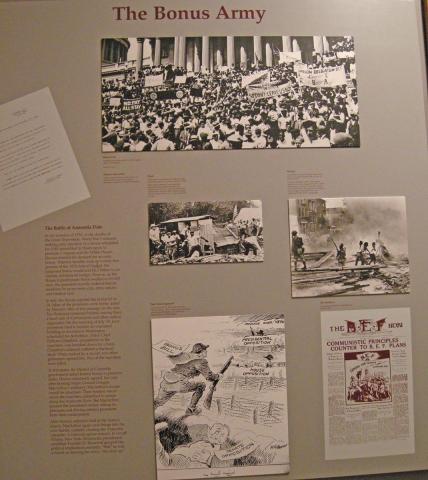
Unemployment, bank failures and farm crises had left Hoover's reputation as an economic miracle-worker in tatters. The Bonus March made the Great Humanitarian look inhumane. In the summer of 1932, World War I veterans seeking early payment of a bonus scheduled for 1945 marched on Washington. In July, the Senate rejected the bonus and most of the Bonus Army returned to their homes. 10,000 remained behind. On the morning of July 28, a scuffle with the police turned into a riot, and the city government asked President Hoover to send troops. Hoover ordered Gen. Douglas MacArthur to quell the riot using as little force as possible. MacArthur, fearing revolution, ignored the President's orders, advanced on the protesters with tanks and tear gas, and burned the Bonus Army's encampment to the ground. A national uproar ensued.
"We are opposed by 6-million unemployed, 10,000 bonus marchers, and 10-cent corn," said Herbert Hoover as he prepared to run for reelection in 1932. Unwilling to concede race to Roosevelt, and hoping that enough Americans still had faith in his leadership, Hoover took to the campaign trail beginning with an October 4 speech on farm policy. He campaigned relentlessly over the next five weeks, but lost the election in a landslide bigger than the one that had swept him into office four years earlier.
